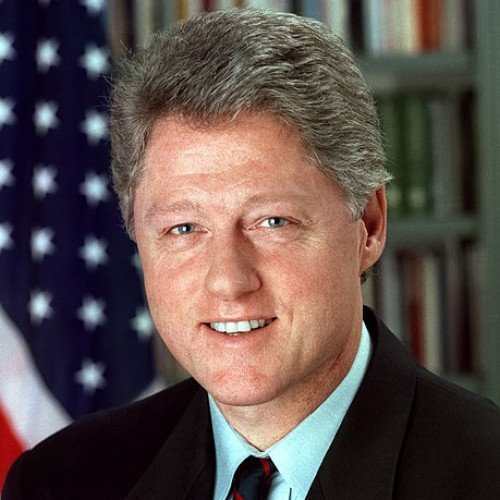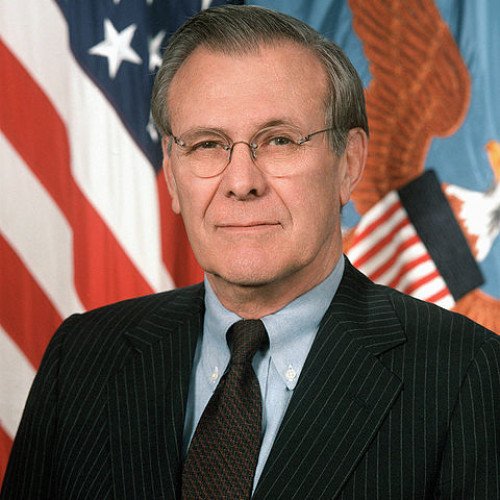Bill Clinton VS Donald Rumsfeld

Bill Clinton
William Jefferson Clinton (né Blythe III; born August 19, 1946) is an American lawyer and politician who served as the 42nd president of the United States from 1993 to 2001. Prior to his presidency, he served as governor of Arkansas (1979–1981 and 1983–1992) and as attorney general of Arkansas (1977–1979). A member of the Democratic Party, Clinton was known as a New Democrat, and many of his policies reflected a centrist "Third Way" political philosophy. He is the husband of former secretary of state, former U.S. senator, and two-time candidate for president Hillary Clinton. Clinton was born and raised in Arkansas and attended Georgetown University, University College, Oxford, and Yale Law School. He met Hillary Rodham at Yale and they were married in 1975. After graduating from law school, Clinton returned to Arkansas and won election as state attorney general, followed by two non-consecutive terms as Arkansas governor. As governor, he overhauled the state's education system and served as chairman of the National Governors Association. Clinton was elected president in 1992, defeating incumbent Republican President George H. W. Bush. At age 46, he became the third-youngest president in history. Clinton presided over the longest period of peacetime economic expansion in American history. He signed into law the North American Free Trade Agreement (NAFTA) and the Violent Crime Control and Law Enforcement Act, but failed to pass his plan for national health care reform. In the 1994 elections, the Republican Party won unified control of Congress for the first time in 40 years. In 1996, Clinton became the first Democrat since Franklin D. Roosevelt to be elected to a second full term. He passed welfare reform and the State Children's Health Insurance Program, as well as financial deregulation measures. He also appointed Ruth Bader Ginsburg and Stephen Breyer to the U.S. Supreme Court. During the last three years of Clinton's presidency, the Congressional Budget Office reported a budget surplus—the first such surplus since 1969. In foreign policy, Clinton ordered U.S. military intervention in the Bosnian and Kosovo wars, signed the Dayton Peace agreement, signed the Iraq Liberation Act in opposition to Saddam Hussein, participated in the Oslo I Accord and Camp David Summit to advance the Israeli–Palestinian peace process, and assisted the Northern Ireland peace process. In 1998, Clinton was impeached by the House of Representatives, becoming the second U.S. president to be impeached, after Andrew Johnson. The impeachment was based on accusations that Clinton committed perjury and obstruction of justice for the purpose of concealing his affair with Monica Lewinsky, a 22-year-old White House intern. He was acquitted by the Senate and completed his second term in office. Clinton left office with the highest end-of-office approval rating of any U.S. president since World War II, and his presidency has been ranked among the upper tier in historical rankings of U.S. presidents, however he has also been subject to substantial criticism for his sex scandals and lies, especially in the wake of the MeToo movement. Since leaving office, he has been involved in public speaking and humanitarian work. He created the Clinton Foundation to address international causes such as the prevention of AIDS and global warming. In 2004, Clinton published his autobiography, My Life. In 2009, he was named the United Nations Special Envoy to Haiti and after the 2010 Haiti earthquake, he teamed up with George W. Bush to form the Clinton Bush Haiti Fund. In addition, he secured the release of two American journalists imprisoned by North Korea, visiting the capital Pyongyang in 2009 and negotiating their release with then-North Korean leader Kim Jong-il. He has remained active in Democratic Party politics, campaigning for his wife Hillary's presidential campaigns in the 2008 and 2016 presidential elections.
Statistics for this Xoptio

Donald Rumsfeld
Donald Henry Rumsfeld (born July 9, 1932) is a retired American politician. Rumsfeld served as Secretary of Defense from 1975 to 1977 under Gerald Ford, and again from January 2001 to December 2006 under George W. Bush. He is both the youngest and the second-oldest person to have served as Secretary of Defense. Additionally, Rumsfeld was a three-term U.S. Congressman from Illinois (1963–69), director of the Office of Economic Opportunity (1969–70), counsellor to the president (1969–73), the United States Permanent Representative to NATO (1973–74), and White House Chief of Staff (1974–75). Between his terms as Secretary of Defense, he served as the CEO and chairman of several companies. Born in Illinois, Rumsfeld attended Princeton University, graduating in 1954 with a degree in political science. After serving in the Navy for three years, he mounted a campaign for Congress in Illinois's 13th Congressional District, winning in 1962 at the age of 30. While in Congress, he was a leading co-sponsor of the Freedom of Information Act. Rumsfeld reluctantly accepted an appointment by President Richard Nixon to head the Office of Economic Opportunity in 1969; appointed counsellor by Nixon and entitled to Cabinet-level status, he would also head up the Economic Stabilization Program before being appointed ambassador to NATO. Called back to Washington in August 1974, Rumsfeld was appointed chief of staff by President Ford. Rumsfeld recruited a young one-time staffer of his, Dick Cheney, to succeed him when Ford nominated him to be Secretary of Defense in 1975. When Ford lost the 1976 election, Rumsfeld returned to private business and financial life, and was named president and CEO of the pharmaceutical corporation G. D. Searle & Company. He was later named CEO of General Instrument from 1990 to 1993 and chairman of Gilead Sciences from 1997 to 2001. Rumsfeld was appointed Secretary of Defense for a second time in January 2001 by President George W. Bush. As Secretary of Defense, Rumsfeld played a central role in the invasion of Afghanistan and invasion of Iraq. Before and during the Iraq War, he claimed that Iraq had an active weapons of mass destruction program; yet no stockpiles were ever found. A Pentagon Inspector General report found that Rumsfeld's top policy aide "developed, produced, and then disseminated alternative intelligence assessments on the Iraq and al Qaida relationship, which included some conclusions that were inconsistent with the consensus of the Intelligence Community, to senior decision-makers". Rumsfeld's tenure was controversial for its use of torture and the Abu Ghraib torture and prisoner abuse scandal. Rumsfeld gradually lost political support and he resigned in late 2006. In his retirement years, he published an autobiography Known and Unknown: A Memoir as well as Rumsfeld's Rules: Leadership Lessons in Business, Politics, War, and Life.